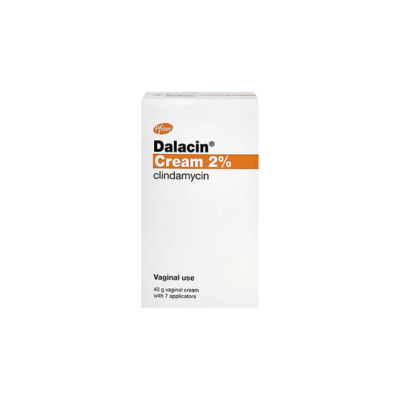Dalacin 2% Vaginal Cream
- Quick and Effective Relief
- Convenient and Easy to Use
- Restores Vaginal Balance
Dalacin 2% Vaginal Cream
Category:Bacterial VaginosisDalacin 2% Vaginal Cream is a prescription antibiotic cream used for the treatment of bacterial vaginosis (BV), a common vaginal infection. It contains the active ingredient clindamycin phosphate, which works to eliminate the bacteria responsible for the infection. The cream effectively relieves symptoms such as unusual, smelly discharge and restores vaginal comfort.
Fetching Data...
All inclusive services
No extra costs
Free tracked delivery
Delivered in plain packaging
Prescription included
No consultation charges
Frequently Asked Questions for Dalacin 2% Vaginal Cream
How It Works
Dalacin 2% Vaginal Cream delivers the antibiotic clindamycin phosphate directly to the affected area. It works by stopping the growth and spread of harmful bacteria, addressing the infection at its source. Used consistently over 7 consecutive days, it effectively clears the infection and restores balance.
How to Use Dalacin Vaginal Cream
- Use 1 full applicator (5 grams) of cream at bedtime for 7 consecutive nights.
- Insert the cream deep into the vagina using the disposable applicators provided in the pack.
- Ensure you wash your hands thoroughly both before and after applying the cream.
- Always follow the instructions provided in the Patient Information Leaflet included with your treatment.
Potential Side Effects
Some individuals may experience mild side effects while using Dalacin Cream. Common side effects include:
- Vaginal irritation or itching
- Mild abdominal cramps
- Unusual discharge
- Vaginal thrush or other infections
If you develop severe diarrhoea, blood in stools, or experience an allergic reaction such as swelling or difficulty breathing, discontinue use immediately and seek medical advice.
Warnings and Precautions
- Avoid sexual intercourse during treatment, as Dalacin may weaken condoms and diaphragms, reducing their effectiveness.
- Do not use this medication if you have Crohn’s disease, ulcerative colitis, or a history of severe diarrhoea after taking antibiotics.
- Speak to your doctor if you are pregnant or breastfeeding before starting treatment.
For full details, always refer to the Patient Information Leaflet included with the medication. If you have any concerns or questions, consult your doctor or pharmacist.
